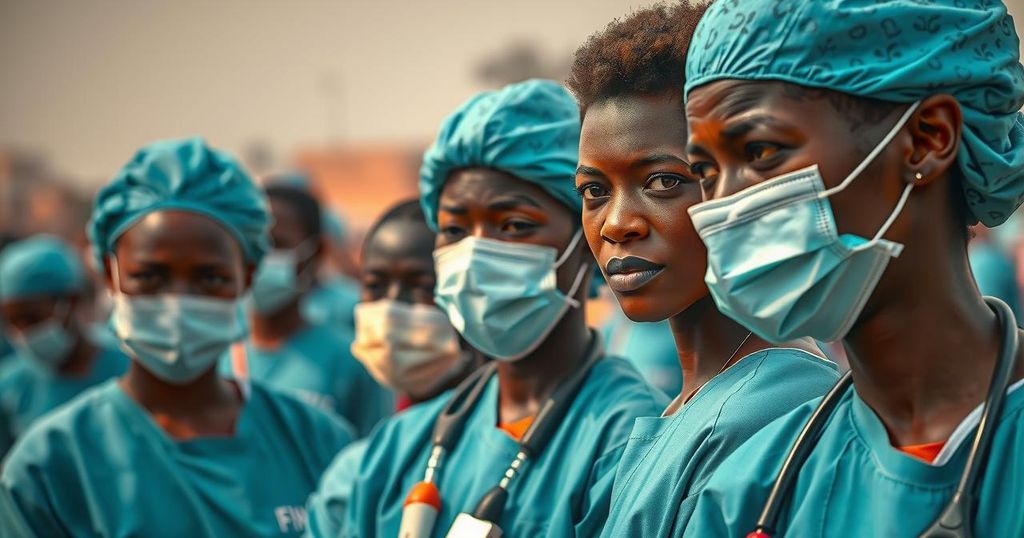Sudan’s Doctors Face Unprecedented Challenges Amid Ongoing War

Sudan’s healthcare workers, particularly in Omdurman, are enduring immense challenges due to the ongoing conflict that has significantly compromised the medical infrastructure. Doctors are treating severe injuries from violence and witnessing rapid malnutrition among children. The war has led to numerous attacks on healthcare facilities, rendering 90% in conflict zones non-functional. The call for urgent international aid becomes ever critical to prevent a total collapse of healthcare services in the nation.
In Sudan, healthcare professionals, particularly doctors, are encountering unprecedented challenges amidst a protracted conflict that has drastically deteriorated the nation’s medical infrastructure. Dr. Mohamed Moussa of Al-Nao hospital continues to serve his patients, undeterred by the surrounding violence, stating, “The bombing has numbed us.” This statement encapsulates the grim reality faced by healthcare workers in Omdurman, situated within the turmoil of greater Khartoum, where incessant gunfire and airstrikes have become a normal backdrop to their responsibilities.
The strife, erupting in April 2023 between army chief Abdel Fattah al-Burhan and his former deputy, Mohamed Hamdan Daglo, has resulted in significant casualties with tens of thousands killed and over 12 million displaced. This situation has been characterized by an overwhelming humanitarian crisis, as categorized by aid organizations such as the International Rescue Committee. As hospitals transform into battle zones, the role of healthcare workers has shifted dramatically.
In Al-Nao, doctors are confronted with harrowing cases, including severe gunshot wounds and amputations among young children, underscoring the conflict’s relentless toll. Furthermore, attacks on healthcare facilities have increased, with the World Health Organization reporting at least 119 confirmed incidences of violence against healthcare institutions, signifying a blatant disregard for civilian safety.
According to investigative data from Yale University and the Sudanese American Physicians Association, nearly half of Khartoum state’s hospitals have sustained visible damage since the conflict’s onset. A union spokesperson remarked that, “Doctors make no distinction between one patient and another.”
The Union of Sudanese Doctors has highlighted the dire state of medical facilities, with approximately 90 percent closed in conflict areas, leaving the populace deprived of essential medical care. Tragically, medical personnel have also been targeted, with 78 health workers reportedly killed as a result of ongoing violence. Furthermore, conditions compound as healthcare providers grapple with a burgeoning crisis of malnutrition and associated illnesses, with many children arriving critically ill at pediatric facilities.
Amid these challenges, organizations like the International Committee of the Red Cross call for immediate support to avert a further collapse of medical services. Dr. Moussa reflects the resilience of healthcare workers, emphasizing their moral obligation to care for those in need, despite overwhelming circumstances.
Thus, the healthcare system in Sudan stands on the precipice of complete disintegration, demanding urgent international assistance and scrutiny to restore essential healthcare capabilities and protect those who serve on the frontline of this humanitarian crisis.
The conflict in Sudan has escalated into a severe humanitarian crisis, deeply impacting its healthcare system. Triggered by a struggle for power between rival military leaders, the violence has resulted in widespread displacement, destruction of medical facilities, and significant loss of life. The healthcare infrastructure, which was tenuous before the conflict, has rapidly deteriorated under the pressures of war, forcing medical professionals to operate under life-threatening conditions while managing the care of war-related injuries and rising incidences of malnutrition and starvation. The situation has been described as potentially the worst humanitarian crisis ever documented, calling for immediate international attention and support.
In summary, the ongoing war in Sudan has rendered the healthcare system nearly unrecognizable, with medical professionals like Dr. Moussa embodying the courage and resilience needed to persist amidst chaos. The overwhelming challenges they face, compounded by violent attacks on medical facilities and personnel, underscore the urgent need for global intervention to safeguard health services and support the people of Sudan. Without immediate assistance, millions will remain without access to life-saving medical care.
Original Source: www.barrons.com








